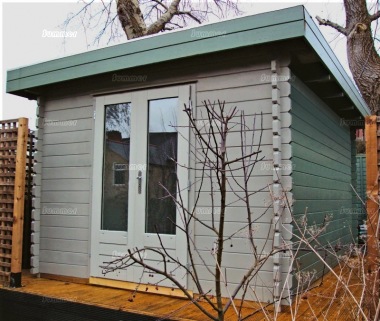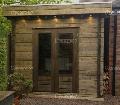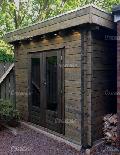Click this messge to hide it.
- All timber used in the construction of this log cabin originates from sustainable forests
- These log cabins are untreated as standard - optional preservative treatments available
- Interlocking 45mm or 70mm thick tongued and grooved wall logs
- 45mm log cabins feature pressure treated ex 3"x3" foundation beams (finished size 70mm x70mm)
- 70mm log cabins feature pressure treated ex 4"x3" foundation beams (finished size 90mm x70mm)
- Substantial timber floor
- Internal skirting boards
- 19mm thick tongued and grooved roof boards (finished size after machining)
- As with most log cabins, the roof is supplied unassembled with the rafters and roof boards cut to size
- Durable and low maintenance one piece EPDM rubber roof surface with drainage outlet and downpipe
- Substantial timber fascia boards to front, rear and sides
- Doors glazed with annealed glass (no plastic, acrylic, styrene or perspex)
- Premium double glazed doors with 24mm thick argon filled double glazing units, 16mm air gaps, a 1.1 U value and fitted with rubber weatherstrips to reduce draughts
- Modern large pane glazing style
- Doors are joinery made with fully profiled timbers and morticed and tenoned joints throughout
- Double hinged doors, fully glazed with high security mortice lock and lever handles in a chrome finish
- Durable aluminium door threshold
- Double door width 4'0" (1210mm)
- Double door height 5'11" (1800mm)
- External roof overhang 10" to all sides (250mm)
- External eaves height approximately 7'5" (2250mm)
- External ridge height approximately 8'2" (2500mm)
- External cabin sizes do not include the interlocking log corners
- Internal cabin sizes - subtract 90mm if the logs are 45mm thick, subtract 140mm if the logs are 70mm thick
- This building is easy to deliver if access is restricted - all sections will pass through a normal single door
LOG CABINS - THE BENEFITS: Log cabins are popular for many reasons, especially as a comfortable garden room to sit and relax in but also as a workshop or heavy duty storage shed. On the outside cabins have a chunky look and feel. On the inside, with no internal framework, the clean lines look smarter than the inside of a traditional shed or summerhouse. In addition, the wall logs are thicker than the shiplap cladding used in traditional sheds and summerhouses, which provides better insulation. If you want the option of winter use we recommend floor and roof insulation, which is difficult to fit retrospectively so it needs to be fitted with the cabin. We offer low price insulation packs complete with fixings and instructions. Where available, double glazing also improves the insulation especially if the cabin has a large glazed area. Another significant benefit of log cabins is that you get more wood for your money when compared with a traditional shed or summerhouse or garden office. With no prefabricated wall panels a log cabin requires less production time.
NORDIC SPRUCE: This building is manufactured from 100% Nordic Spruce, the best quality timber used in log cabin construction. Nordic Spruce is grown primarily in the well managed forests of Scandinavia, Siberia and the coldest parts of Northern Europe. The cold climate ensures slow growth. The growth rings are much closer together than trees grown in warmer climates. As a result the timber is heavy and durable with a dense grain pattern. These forests are expertly managed on a sustainable basis so Nordic Spruce is an enviromentally friendly choice.
NATURAL WOOD: First, high grade timber is dried in kilns until it reaches the optimum moisture content, then it is planed smooth and machined into tongued and grooved logs and boards. Next the logs are precisely machined at the ends to ensure a precise fit. Finally, each cabin is carefully packed and wrapped. When you unwrap it the wood is untreated. We recommend treating it only after the cabin has been successfully installed and ideally within a week or two. Treating the logs before fitting may cause the wood to swell up and the logs may not fit together correctly. If you are fitting your cabin in a restricted space where future access will be difficult you can stain the logs during installation by reaching down a few logs at a time as you fit them.
FULLY INTERLOCKING LOG CORNERS: These traditionally made log cabins feature interlocking corner logs. Each wall log is precisely machined and notched out to ensure a strong and weatherproof joint. The first log is laid at the bottom and the rest slot into each other, working upwards one log at a time. No screws or nails are required which makes installation easier and also allows for timber movement. The finished corner assembly is not only immensely strong but also weatherproof and draughtproof. If possible cabins with interlocking logs should be treated after assembly. Treating the logs on site before fitting requires considerable care. If swollen the precision milled joints may not slot together.
JOINERY DOORS & WINDOWS: These log cabins feature joinery made door leaves and window sashes with morticed and tenoned joints throughout. This traditional jointing process is commonly used in the housebuilding industry when timber windows and doors are specified. A rebate or mortice is cut out in one piece of wood which precisely matches a tongue or tenon cut in the other piece of wood. Morticed and tenoned joints are the strongest type of joint used in the construction of wooden windows and doors. High quality handles, locks and hinges are also included.
HIGH PERFORMANCE DOORS AND WINDOWS WITH WEATHERSTRIPS: Our high performance premium window and door frames feature weatherstrips to reduce draughts. Weatherstrips are rubber gaskets which are fitted to the door and window frames. The weatherstrips are fitted in the rebates between the fixed outer frames and the hinged parts i.e. the window sashes and door leaves. As the doors and windows are closed the weatherstrips are compressed to form a seal. Heat loss is significantly lower through windows and doors which are fitted with weatherstrips.
DOUBLE GLAZING: Our double glazed doors and windows ensure that your log cabin is warmer and cheaper to heat. We recommend double glazing if you want to use your cabin all year round. Double glazing also provides additional sound insulation. If you expect to use your cabin frequently and often for prolonged periods we also recommend floor and roof insulation. Insulation ensures a more comfortable environment on the hottest days in the summer and the coldest days in winter.
HEAVY DUTY TONGUED AND GROOVED FLOOR: This cabin includes a heavy duty timber floor with tongued and grooved floor boards and substantial floor joists. Skirting boards are also included to ensure a neat internal finish. The floor joists and tongued and grooved boards are supplied loose for fast assembly on site. Unlike many log cabin floor kits, all timber is cut to size which saves time during installation. It also ensures that there are no visible joins in the finished floor. The floor is assembled quickly with no visible joints. With some cheaper cabins the boards must be cut to fit on site. This takes much longer and many of the joins are visible afterwards.
PRESSURE TREATED FOUNDATION BEAMS: Substantial foundation beams are laid on the base to support the walls. This ensures that the wall logs are not in contact with the ground. The foundation beams are pressure treated for durability. Pressure treatment is a lifetime preservative treatment. The preservative is forced into the timber under pressure in a vacuum and penetrates below the surface. All other treatments apply a coat of stain to the surface of the timber only. With pressure impregnated timber, the chemicals are permanently fixed in the wood. Tanalith E is the most popular preservative used so pressure treated wood is often described as tanalised. With the foundation beams this log cabin can be built without a floor if required.
ONE PIECE EPDM ROOF: A tough EPDM rubber membrane is made in one piece to the size of your roof with no joins. It is easily fitted within a few minutes at normal temperatures with no heat required. EPDM rubber is completely inert, UV stable and not affected by extreme temperatures. It never perishes and it will not rot, split, crack or degrade. EPDM rubber lasts for years with little or no maintenance. It has been widely used in flat roofing for over 40 years from Alaska to the Middle East. It is increasingly popular in the UK where it is widely used for re-roofing flat roof garages and extensions. Even in extreme weather conditions EPDM rubber remains flexible and it will stretch to absorb any movement as a timber roof expands and contracts with the seasons.
LENGTH AND WIDTH: Sizes are sometimes rounded to the nearest nominal size for ease of reading but the correct external wall sizes are listed alongside the price. The first dimension listed is the width and the second dimension is the length. The width refers to the side walls. The length refers to the front and rear walls including the door wall. The sizes listed are the external wall sizes. These sizes do not include the roof overhang. Many other suppliers quote the overall roof size which is much larger. All sizes are approximate.

































